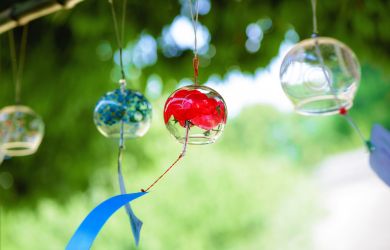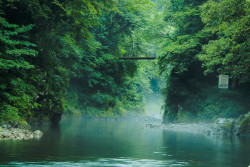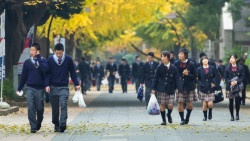
Originally published on metropolis.co.jp on August 2013
ENTER THE TWITTERVERSE

- A nursing student in Gifu was criticized for tweeting in-class photos of human organs along with a message that read, “We have a colon from a hospital patient.”
- It was reported that prior to last month’s Upper House elections, 29 Twitter users set up accounts in which they posed as leaders of major political parties.
- Archaeologists in Kyoto made a surprising discovery while examining the underside of a Kamakura-era piece of pottery: the oldest surviving example of a Japanese writing lesson.
- A former employee of cosmetics company Kanebo reached a settlement with the firm over an incident in which she was forced to wear a fortune-teller costume at a training session “as punishment for not reaching a sales target.”
THE WAGES OF SIN
- A 22-year-old hoodlum who was trying to defraud an elderly man out of ¥1 million in a bank scam in Nagoya had the misfortune of running into two off-duty cops, who smelled a rat and arrested the would-be robber.
- Seven people were injured when a woman sprayed a mace-like substance in a public toilet at JR Takadanobaba station.
- Officials at the transport ministry say municipal governments have fixed only 15 percent of the estimated 69,000 bridges around the country in need of repairs.
- Noted without comment: “Kishida Says ‘No Contact’ Made with China’s Wang in Brunei” (via Mainichi Japan)
BREAKTHROUGHS
- Japanese researchers say they’ve “confirmed the existence of a previously undetected type of neutrino oscillation.” They made the discovery by sending a bunch of muon neutrinos on a 295km-long trip from Ibaraki to Gifu.
- Japanese and Austrian researchers have developed “the world’s thinnest and lightest organic light-emitting diode.” They hope the device can be used in medical applications.
- Doctors in Okayama performed the first-ever transplant involving the middle lobe of a lung taken from a living person. The donor was a mom and the recipient her three-year-old son.
- Meanwhile, a survey by the Japan Organ Transport Network found that just 15.7 percent of respondents are registered as organ donors.
WATERWORLD
- Scientists at the Research Center for Aquatic Genomics say they’ve identified evolutionary advances in the eyes of bluefin tuna that have helped the fish “measure the distance to prey in the ocean.”
- A recent surge in violent rainstorms nationwide is driving internet traffic to XRAIN, a website operated by the land ministry that provides real-time information about downpours.
- Officials at the Metropolitan Central Wholesale Market say the scorching-hot summer has caused the price of lettuce to nearly double from last year.
- Meanwhile, authorities at the Kanto bureau of the land ministry say a lack of rain has caused the water volume in some areas of the Tone River to drop by 40 percent compared to average years.
BETTER LATE THAN NEVER
- At a ceremony in Washington, DC, the Japanese Ambassador to the US honored former President Ronald Reagan and other officials for “restoring the honor of Japanese-Americans interned during World War II.”
- For the first time since the Japan Coast Guard was founded in 1948, officials have redesigned the ID cards carried by personnel. The new ID’s feature an image of a compass.
- Japanese and American scientists are trying to develop a way to measure the radioactivity of melted fuel at the Fukushima Daiichi power plant.
- Bottom Story of the Week: “Ibaraki Town’s Tank Attracts Tourists” (via The Japan News)







